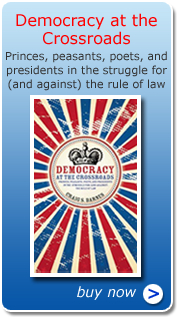Last week UN inspectors found 16 canisters in Iraq that might have held, or might in the future be able to hold, chemical weapons. They are empty now, but they might not have been always empty. They might be dangerous some time in the future. Neither the original Iraqi 12,000-page report, nor any subsequent information, told us of these 16 canisters. Saddam was therefore not cooperating. He was in "material breach." The US will be justified, therefore, to send an invasion force of 150,000 troops because he is not cooperating. The old test was disarmament but the new test for war will be whether Saddam is cooperating, and he fails.
Last year, according to the Inspector General of the United States and Congressman Dennis Kucinich of Ohio, the Pentagon could not properly account for $1.2 trillion in transactions. It had, additionally, written off $22 billion worth of items as "lost." It had stored 30 billion worth of spare parts it did not need. We will attack Iraq, nevertheless, because their impoverished, crippled army lost track of, or did not list, 16 weapons canisters. We will spend between $50 billion and $200 billion, ship out 150,000 personnel in the army, navy, marines and air forces to make sure that Saddam Hussein reports every case of 16 weapons canisters.
The second new test for the president's war will be whether Saddam is lying. The president says he is tired of the lying. Eleven years of lying is enough. We will go to war to stop the lying. Deceit should be punished.
The president does not make clear how we are to weigh the difference between some deceit and other deceit. The president's deceit, for example, is to say that this is a war on terror. But this attack was planned and publicly urged in 1998 by then-conservative leader Paul Wolfowitz. Wolfowitz is now the Deputy Secretary of Defense. Wolfowitz urged the attack three years before 9/11, in the Weekly Standard, a Washington magazine, under the title: "Saddam Must Go: A How-to Guide." It was not at that time about terror; it was about extending American influence in the world. To call this a war on terror, when the plans were laid years before 9/11, is also deceit.
The president's deceit might also be said to call an empty canister found in a pile in the desert a "warhead." The president's deceit might be to say this January that he has not decided to go to war. The president's deceit in October was to say he would go back to the United Nations for a second vote. The president's deceit in September was to let Colin Powell assure France that they would have a full debate in the Security Council before going to war. The president's deceit in July was to order double stockpiling of laser-guided bombs while saying publicly he had no specific intention to use them. The president's deceit was to tell the American people that this war had no domestic political agenda, to pretend that his October outrage was not timed for the November elections or that the UN inspection report was not timed to trigger his January State of the Union message. The president's rhetoric is clouded in a sandstorm of deceits and yet his new test for Saddam Hussein is that the president is tired of lying.
Like a boy with his fist in the cookie jar, every utterance from the White House this week seemed designed to overcome these deceits. The president wants to prepare the American people to attack Iraq without the United Nations and without our traditional allies, to assure us that when the fight begins the weak sisters will follow. In this effort, the White House has begun to demean the UN as weak and chief inspector Hans Blix, as craven. In starting to call people names, however, the president and Press Secretary Ari Fleischer are in danger of demeaning themselves as much as the UN. Much of the world is understandably lining up to support Blix, if for no other reason than because he is not calling people names.
The president seems confident that the American people will rally. Joblessness and healthcare and potholes in the federal highways will not seem so important to a people at war. But France has said they will not rally. Germany has said they will not rally. Ninety percent of the people of Turkey are saying, in polls, that they will not rally. Hundreds of thousands of people in the streets of Washington last weekend said that they will not rally. Worldwide, governments and ordinary people have rejected the new excuses for this war. They said in their signs and speeches that they think the president is not sincere about those excuses, that he intends war no matter what the test. More than he realizes, the president is on his own.
